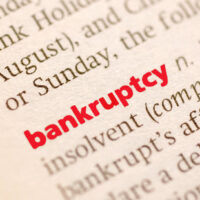What Are Exceptions to Discharge in Bankruptcy?

Are you considering filing for bankruptcy in Florida? If so, one of the first steps you should take is to determine whether your debts are eligible for discharge — especially if you are seeking a fresh start by filing for Chapter 7 bankruptcy. To be clear, many consumer debts can be discharged according to the US Bankruptcy Code, but there are certain types of debts that are classified as “exceptions to discharge.” What is an exception to discharge, and what do you need to know about exceptions to discharge concerning your bankruptcy case? Our St. Petersburg bankruptcy lawyers can explain, and we can speak with you today about your bankruptcy options.
Defining an Exception to Discharge
Section 523 of the US Bankruptcy Code lists a number of “exceptions to discharge.” What does this term mean? A “discharge” of a debt means that the debtor is no longer liable for that debt and that it is eliminated for the debtor. Thus, any debt that is listed as an “exception to discharge” refers to a type of debt that cannot be cleared or erased in a consumer bankruptcy case.
Before you file for consumer bankruptcy, you will want to be certain that all, or at least the majority, of your debts are dischargeable and are not classified as exceptions to discharge.
Common Exceptions to Discharge
There are a number of exceptions to discharge, but some of the most common include, for example:
- Certain tax debt;
- Debt incurred through fraud;
- Debt from “luxury goods or services”;
- Certain debt incurred as a result of causing injury to another party; and
- Family support debt, such as alimony or child support.
Typically, common debts like credit card debt, medical debt, personal loan debt, and related forms of debt are not exceptions to discharge and can be discharged in a bankruptcy case.
Student Loan Debt: An Exception to the Exception
While educational debt is listed as an exception to discharge, US bankruptcy law also recognizes an exception to the exception. And, in addition, it has recently become even easier for debtors to prove that they meet this exception to the exception (in other words, it has become easier to have student loans discharged in bankruptcy).
To have educational debt discharged, the debtor must be able to prove that continuing to make payments on that debt would impose an undue hardship. Debtors now can prove the “undue hardship” exception in a bankruptcy case through a streamlined process that involves filling out an attestation form that gives a picture of their present and future ability to pay, and the good faith effort made toward payment in the past.
Contact a St. Petersburg Bankruptcy Attorney Today
Anyone who is considering a bankruptcy filing should seek legal advice from one of the experienced St. Petersburg bankruptcy attorneys at the Law Offices of Stephen Barszcz as soon as possible. It will be critical to know up front whether your debts are likely to be dischargeable and how you can move forward with a bankruptcy case that will ultimately provide you with a fresh start financially. Our firm is here to help. Contact us today to discuss your financial circumstances and your bankruptcy options.
Source:
law.cornell.edu/uscode/text/11/523






